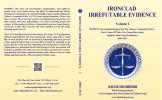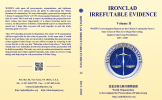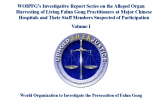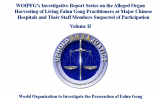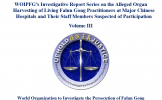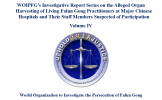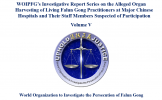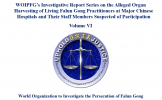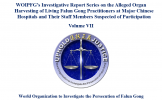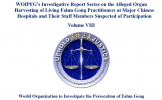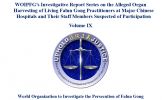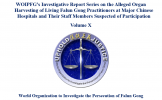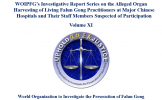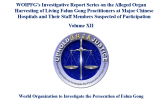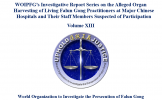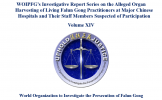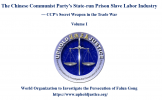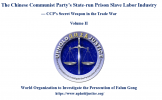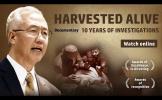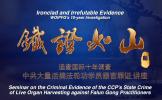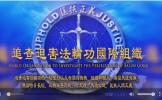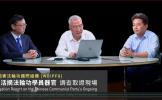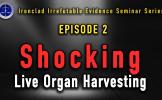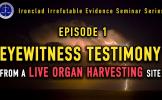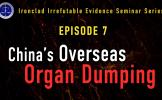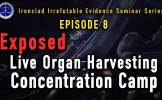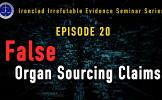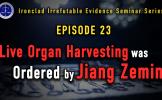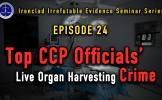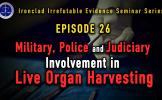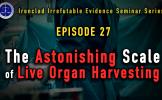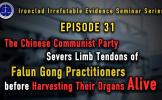Human Rights Watch - Excerpts from the Publication--A
Human Rights Watch - Excerpt from "Dangerous Meditation"
"China's efforts to equate the Falungong with terrorists are ludicrous...he charge that Falungong threatens the stability of China does not hold up. Its claim that belief in Falungong is a public health menace is equally bogus. The danger to health comes from the treatment its practitioners receive at the hands of the police and prison officials." HRW, 01/2002.
A "rule of law" veneer
In contrast to earlier campaign-style crackdowns, Chinese leaders have justified their campaign against Falungong by citing their determination to advance the "rule of law" in China and to strengthen the Chinese system of "socialist democracy."70
Between August 3-11, 1999, two to three weeks after Falungong was banned, Chinese media published a series of comments characterizing the campaign as "a struggle between rule by law and anti-rule by law" and expressing the opinion that the struggle had to be handled "according to law"71 Articles in Xinhua andPeople's Daily described in great detail the constitutional provisions and laws and regulations Falungong had failed to uphold. (See Appendix I-II.)
As a Xinhua commentator noted:
The constitution and laws of our country have explicitly stipulated that the state must strengthen the building of socialist spiritual civilization and oppose capitalist, feudal and other decadent ideologies. Citizens must observe public order and social ethics. Any action of undermining and disrupting social order must be banned. However, Li Hongzhi has disregarded the basic principles and stipulations of our constitution and laws by concocting the so-called Falun Dafa, establishing an illegal organization, and wantonly propagating feudal, superstitious and anti-scientific false reasoning and heretical ideas. He has brazenly formed an illegal association, assembled a crowd to make trouble, and illegally sold books and journals, audio-visual products and other propaganda publications, which propagate the Falun Dafa, to seek exorbitant profits, harm people's health, and severely disrupt social order. All these have constituted a heinous crime. Therefore, our struggle against Li Hongzhi and the Falun Gong organization manipulated by him is not only a serious ideological and political struggle, but also a struggle between rule by law and anti-rule by law. We not only must ideologically understand the illegal nature of the Falun Gong, but also take legal measures to resolutely punish the crimes of Li Hongzhi and his illegal Falun Gong organization. We must apply laws as weapons to win a victory [in] the struggle against the Falun Gong.72
Officials emphasized that Falungong followers were punished not for being practitioners, but for violating Chinese law. Some of the laws and regulations used against Falungong were in place when the crackdown began; some were newly enacted or reinterpreted and applied ex post facto. Some new legal standards were specifically directed at Falungong; others, in particular new restrictions on Internet usage, could profitably be used to curb Falungong's communications network even though they were designed with a larger target population in mind.
Human Rights Watch and other commentators have criticized China's judicial system as being driven by the aims of the ruling party, for failing to upholdinternational legal standards and applying new laws ex post facto, for standards that are so broad and vague that they invite arbitrary application, and for its administrative and inherently arbitrary system of reeducation through labor, used extensively to hold Falungong practitioners. In many respects, the government's tactics are strikingly similar to the various extrajudicial campaigns the Chinese Communist Party previously waged against "traitors," "counterrevolutionaries," "imperialists," "rightists" and landlords, among others. Coerced confessions under torture, insistence on recantations (reminiscent of earlier "criticism-self-criticism" sessions), and use of those who recant to "break" others, often leaves those who "broke" with an investment in upholding the government's version of Falungong as an evil cult.
Thus, China's legal system is best characterized as "rule by law," in which law is a malleable weapon against individuals whose opinions China's leadership dislikes or organizations it wants destroyed, rather than "rule of law," in which law is supreme and the leadership accountable to it. By altering laws and creating new laws with the expressed intention of dismantling Falungong, the Chinese leadership has succeeded only in undermining its claim that the judicial system is rooted in a "rule of law" principle. Interpretations of rights guaranteed in China's constitution, freedom of speech, press, assembly, association, procession and demonstration (article 35), and freedom of religious belief (article 36), are subject to situationally-based interpretations rather than being rooted in a body of principles. Their application is politically driven. There is, for example, a set of regulations requiring that a social organization register in order to be legal. But Chinese officials may deny registration because the organization's purpose is to expose a social problem, for example, environmental degradation, to a greater extent than the government considers desirable; because the organization espouses a principle, such as establishment of a two-party system, which the Communist Party rejects;73 or, as in the case of Falungong, because it legitimizes an organization the government fears.
If at the start of the crackdown against Falungong, China's leadership wanted only to punish public order infractions, shut down dangerous health practices, or stop fraud or subversion, there was an extant body of Chinese law available to deal with these offenses. But that was evidently not the leaders' intent. The means they used show instead that they wanted to thoroughly discredit Falungong in the process of dismantling it and that they employed rule of law and justice rationales as a cover and as an excuse.


